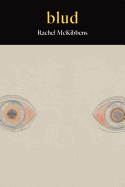
As the word "blud" is slang for mate or companion, it's fitting that Rachel McKibbens's poetry collection leaves an impression of rough-hewn camaraderie, of bonds forged in trauma.
McKibbens (Into the Dark & Emptying Field) is a poet, activist and playwright who has built her reputation as a passionate performer and chronicler of society's disenfranchised. In blud, her verse is rich with imagery and symbolism but moves with a visceral force, as if propelled by the exigencies of living, by "the delirium chorus/ of a rowing mind," as the poet states in "poem written with a sawed-off typewriter."
Throughout four sections, the poems address abuse, misogyny, mental illness and various forms of trauma, but they don't wallow. They produce an urgent sense of self-determination. In "three strikes," the poet describes herself as "Hell-spangled girl/ spitting teeth into the sink,/ I'd trace the broken/ landscape of my body/ & find God/ within myself." There's also a sense in these poems of reaching out to other broken beings, especially women, evoking pathos as well as intense homoeroticism. "I want to soothe her many hands,/ trace each silver bolt of/ childbirth etched along/ her torso, taste the salted/ hole of her, this sacred,/ this blood-hot church," the poet declaims in "sermon."
Religious themes appear more than once; however, as with the title word, common tropes are repurposed to the poet's own vision. In blud, McKibbens unleashes a fierce, fraught voice crying out for others in the wilderness. --Scott Neuffer, writer, poet, editor of trampset

